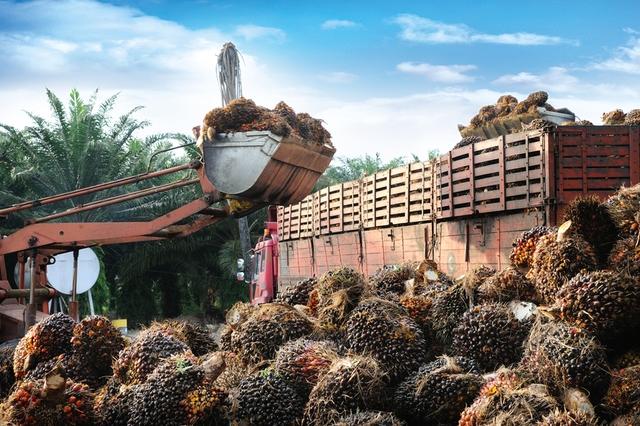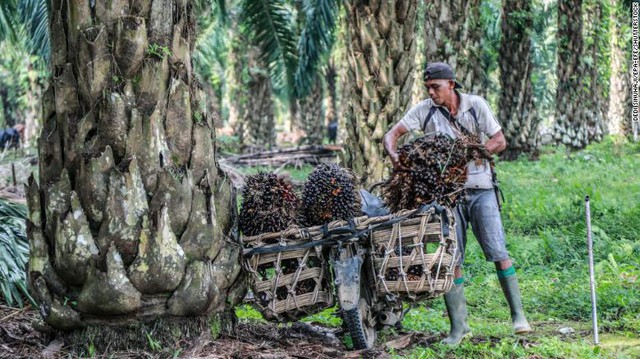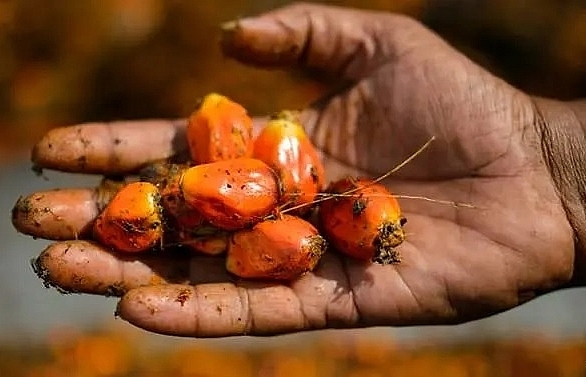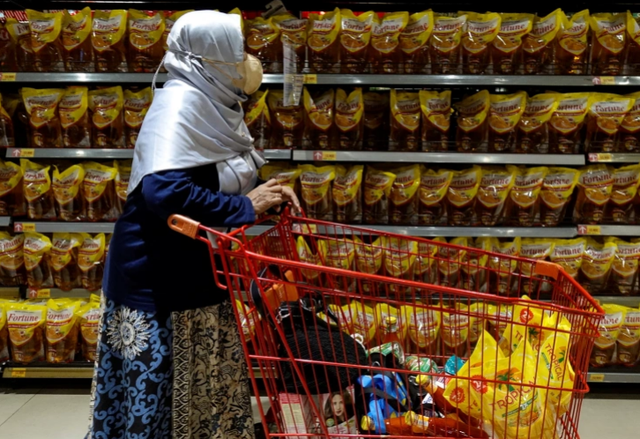An Asian country has officially stopped exporting palm oil, the inflation crisis is getting worse
On April 28, Indonesia began to impose a ban on palm oil exports in the context that the world’s leading palm oil producer is facing a shortage of cooking oil and escalating prices. In the final decision made on the evening of April 27, the Indonesian Government also confirmed that the ban would apply to all oilseeds, not just cooking oil as announced earlier.
According to President Joko Widodo, although the ban will negatively affect the yield of farmers in the short term, this decision will help ensure domestic supply as a priority. The ban will only be lifted when Indonesia actually solves its own shortage problem.
Until then, though, Indonesia’s move to restrict palm oil exports could exacerbate a global food crisis after hundreds of consumer products forced prices up.

Harvesting palm fruit in Indonesia
According to James Fry, president of consulting firm LMC International, Indonesia is the world’s largest producer of palm oil, and Mr. Widodo’s statement has pushed up a series of prices. Crude palm oil futures in Malaysia, used as a benchmark for international prices, were up nearly 7% at one point, according to CNN.
The shock was later softened a bit after Reuters and Bloomberg reported that the Indonesian government might exclude crude palm oil from the restricted list. The remaining products, including palm olein oil and crude palm oil refined products used in cooking and cosmetics, will still be subject to the ban.
In response to Indonesia’s statement, the Indonesian Palm Oil Association-GAPKI said it respects the Government’s decision, but also notes that if the ban impacts the sustainability of the palm oil industry, the association will ask the Government government re-evaluated.
IMPORTANCE OF OIL
Palm oil is a common ingredient found in many foods, cosmetics, and household items. Nearly 50% of all packaged products in supermarkets contain palm oil, according to WWF.
In addition, palm oil is also used for cooking in many countries, including India – the world’s leading importer. As a result, a ban on this important ingredient could cause a wide range of items to increase in price, from cooking oils, instant noodles, snacks, toast to margarine.

People harvest palm fruit
It is known that palm oil prices have been under a lot of pressure due to the tension of the Russia-Ukraine conflict as the market scrambled to find alternatives for sunflower oil shipments stuck at Black Sea ports.
“We are in for a perfect storm. Several other factors, such as droughts in South America and Canada, have also limited the supply of soybean and canola oil.
According to the United States Department of Agriculture (USDA), Indonesia is the number one palm oil producer in the world, accounting for 59% of total global production in 2021, of which more than 30% of production is consumed in the domestic market. India, China, the European Union and Pakistan are the main customers of Indonesia.
Meanwhile, Malaysia and Thailand account for 25% and 4% of global palm oil production, respectively. Colombia, Nigeria and Guatemala are also major producers.
Therefore, right after the news that Indonesia banned palm oil exports, some analysts said that Malaysia could help solve the crisis and partially make up for the shortage of palm oil. However, unfortunately, this country is also facing the problem of supply shortage and labor shortage since the pandemic.
“Inventories are at an all-time low in Malaysia,” the analysts said.

Indonesia is the world’s number one palm oil producer, accounting for 59% of total global production in 2021
According to BV Mehta, CEO of a Solvent Extraction Association, India, a country heavily dependent on vegetable oil imports, was immediately affected after the ban was issued. Producers are now turning to alternative ingredients, such as canola and peanut oils, to cope with rising prices for sunflower and palm oils. India also said it will increase production to ensure food security.
“The price increase during the past two years has taught us to improve product quality and productivity. After the tensions with Russia and Ukraine, now Indonesia has once again taught us a lesson,” said Mr. BV. more.
THE BANNING ORDER AT THE MOST DIFFICULT TIME
CNN assessed that Indonesia’s ban was introduced at the time of the worst price storm for global consumers.
Earlier this month, the Food and Agriculture Organization of the United Nations (FAO) said world food prices rose to a record in March. The geopolitical conflict has also caused many major shocks to the consumer market. cereals and vegetable oils.

Indonesia’s ban comes at the time of the worst price storm for global consumers
Therefore, according to JPMorgan analysts, Indonesia’s export ban is like “adding fuel to the fire”, when the price crisis has not shown any signs of abating.
“This is a warning about the vulnerability of agricultural supply chains in the context of Russia-Ukraine geopolitical tensions and escalating production costs,” the analysts said.
“In a way, the world has relied on Indonesian palm oil ‘to fill a gap’ in a supply disruption, and Indonesia has suddenly stopped that,” said James Fry. .
According to Tosin Jack, Head of Commodities at Mintec in the UK, Indonesia’s move will certainly worsen inflation, already at a record high, and people from Asia to Europe will certainly continue to face faced with persistent inflationary momentum.
According to: CNN, Bloomberg
Following Economic Life
at Blogtuan.info – Source: cafebiz.vn – Read the original article here



